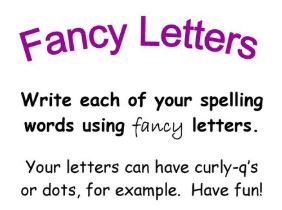19 October 2018
For this week’s spelling homework, we’re going to ‘drop the e for ing‘.
- make becomes making
- have becomes having
Find words ending in ing. Do you always need to ‘drop the e for ing’?
Write a list.
19 October 2018
This week’s spellings are high frequency words and words that have been spelt incorrectly in our writing recently.
Year 1
- there
- love
- one
- put
- pull
Year 2
- has
- saw
- was
- when
- went
- were
- where
- are
12 October 2018
Your spelling rule this week is pluralising words ending in a y. The rule is drop the y for an i and add es.
Pluralise these words:
- activity
- library
- story
- variety
- beauty
- try
- cry
- fly
- history
- baby
- carry
- cherry
Create a nonsense story including as many of these pluralised words as possible.
12 October 2018
For this week’s spelling homework, learn the following words that all contain the ‘ed’ ending that we have been working on in class.
We double when there is a short vowel sound such as the short ‘a’ sound leading to the double ‘p’ in happening.
discovered
drilled
gleamed
glided
happened
hammered
remembered
zoomed
travelled
whizzed
12 October 2018
Use last week’s spelling and write them in fancy writing.

Year 1
- you
- be
- she
- go
- by
Year 2
- behind
- both
- break
- busy
- child
- children
- Christmas
- Halloween
05 October 2018
This week, put these words into the past tense by adding -ed. Then sort into two groups – those which need to double the last letter and those which do not e.g. skip – skipped, jump- jumped
plod, skid, roast, need, drop, trip, swoop, stamp, spot, knit, rest, float, grit.
Now find some of your own.
05 October 2018
This week’s list of spellings are all homophones. Can you draw pictures or diagrams to illustrate the different meanings in a set of homophones? For the test, children will be given the word in a sentence.
weather
whether
you’re
your
here
hear
are
our
05 October 2018
This week’s spellings are part of the common exception word lists from each year group.
Year 1
- you
- be
- she
- go
- by
Year 2
- behind
- both
- break
- busy
- child
- children
- Christmas
- Halloween
28 September 2018
This week your spelling homework is to learn the words on this list with and without apostrophes for contraction.
Check the spelling poster at the back of your homework book for ideas of how to learn them.
| has not = hasn’t | will not = won’t | would not = wouldn’t | I am = I’m | they will = they’ll |
| do not = don’t | I have = I’ve | is not = isn’t | she will = she’ll | were not = weren’t |
28 September 2018
This week’s list of spellings are all homophones – words that mean different things but sound the same.
Some of these homophones have been picked up as common errors in children’s writing. For the test, children will be given the word in a sentence. At home, practise each spelling by writing them in sentences. Think about the meaning of each homophone.
